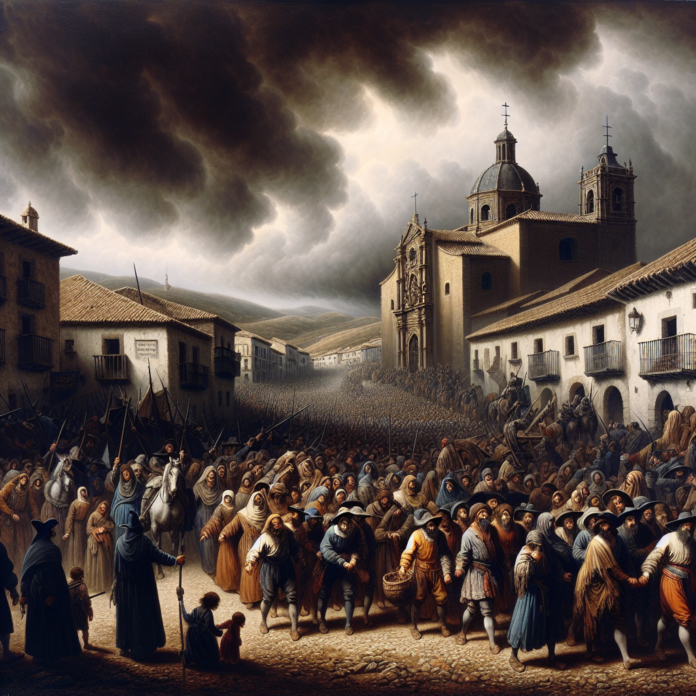In the annals of history, few events highlight the destructive power of bigotry and narrow-mindedness as starkly as the Edict of Expulsion of 1609 in Spain. The decree, which saw the expulsion of the Moriscos—Muslims who had converted to Christianity—from Spain, stands as a somber reminder of the brutal consequences of rigid traditionalism and the resilient spirit of those who yearn for progress and tolerance.
The Background: An Era of Conversion
To fully grasp the severity and implications of the Edict of Expulsion, one must first understand the backdrop of Spain in the early 17th century. Following the Reconquista in 1492, the Catholic Monarchs Ferdinand II of Aragon and Isabella I of Castile had completed the long struggle to reclaim Iberian territories from Muslim rule. This victory was swiftly followed by efforts to solidify Catholic dominance across the region. One significant consequence of these efforts was the forced conversion of Muslims—and Jews—who opted to stay in Spain. These new converts, known as Moriscos, ostensibly embraced Christianity under the pressure of stringent edicts, but a great number continued to practice Islam in secret.
For decades, Spain wrestled with the complex dynamic of a pseudo-religious harmony, hiding beneath a facade of forced uniformity. However, the determination to preserve a "pure" Catholic state lingered continuously. The Moriscos, despite their best efforts to integrate and contribute to society, including their notable agricultural skills and contributions to the economy, were persistently viewed with suspicion and scorn.
The Edict of Expulsion: A Catastrophic Decree
The simmering tensions eventually culminated in the Edict of Expulsion issued by King Philip III. The decree mandated that all Moriscos be expelled from Spain, stripping hundreds of thousands of their homes, belongings, and means of livelihood. The operation, which was brutally enforced over the next five years, was justified under the guise of eradicating potential threats to the Catholic faith and the Spanish kingdom. In reality, it was a callous exercise of power rooted in fear and xenophobia.
Contemporary reports detail the heartbreaking scenes of Morisco families being torn from their homes, driven to ports, and crammed onto ships often in deplorable conditions. Many faced starvation, disease, and death en route to North Africa, their supposed final refuge—a tragic illustration of the immense human cost of the edict.
The Progressive Values Quashed by Traditionalism
The ramifications of the Edict of Expulsion were manifold. Economically, Spain suffered significantly. The Moriscos had been integral to many agricultural and artisanal industries; their abrupt removal caused a severe downturn in productivity. Yet, beyond the economic impact, the most devastating consequences lay in the ethical and cultural realms. Spain’s insistence on homogeneity stifled the rich, multicultural tapestry that had defined the Iberian Peninsula for centuries.
Scheming traditionalists viewed cultural and religious diversity as threats to their monolithic vision of society. Their inability to tolerate differences led them to sever connections with the Moriscos, despite the latter’s generations of contributions. In contrast, a more progressive stance, valuing unity in diversity, would have fostered coexistence, mutual respect, and societal resilience.
The Echoes of Intolerance
The Edict of Expulsion offers a somber parallel to contemporary struggles against intolerance and exclusion. Just as the Moriscos faced persecution because of their religious and cultural heritage, modern minorities often confront systemic discrimination. The historical lens reveals a harsh truth: societies that rigidly cling to exclusionary values often forego their own potential for growth and enrichment, sacrificing it on the altar of misguided traditionalism.
However, the Moriscos’ plight also signifies another enduring truth—the resilience of the human spirit against oppressive forces. Many Moriscos ultimately thrived in their new homes, preserving their heritage and contributing to their adopted societies, illustrating that despite the cruelty of their expulsion, they rejected the identity imposed upon them as eternal others. Their legacy endures as a testament to the power of diversity and the folly of trying to quash it.
Conclusion: Lessons for Today
As we reflect on the Edict of Expulsion and its consequences, we must understand it not merely as a historical event but as a sobering lesson. The ruthless imposition of traditionalism over progressive values of inclusion, tolerance, and mutual respect has, time and again, resulted in societal regression and human suffering.
Today, as we navigate our current societal challenges, the echoes of the past implore us to turn towards inclusion rather than exclusion, understanding rather than suspicion, and empathy rather than fear. The spirit of those who suffered under the Edict of Expulsion encourages us to envision a world where diverse identities coexist, contributing to the vibrancy and resilience of our shared human tapestry. It is this progressive vision that can transform societies, warding off the shadows of a history marred by intolerance and preserving the luminous potential of our collective future.
